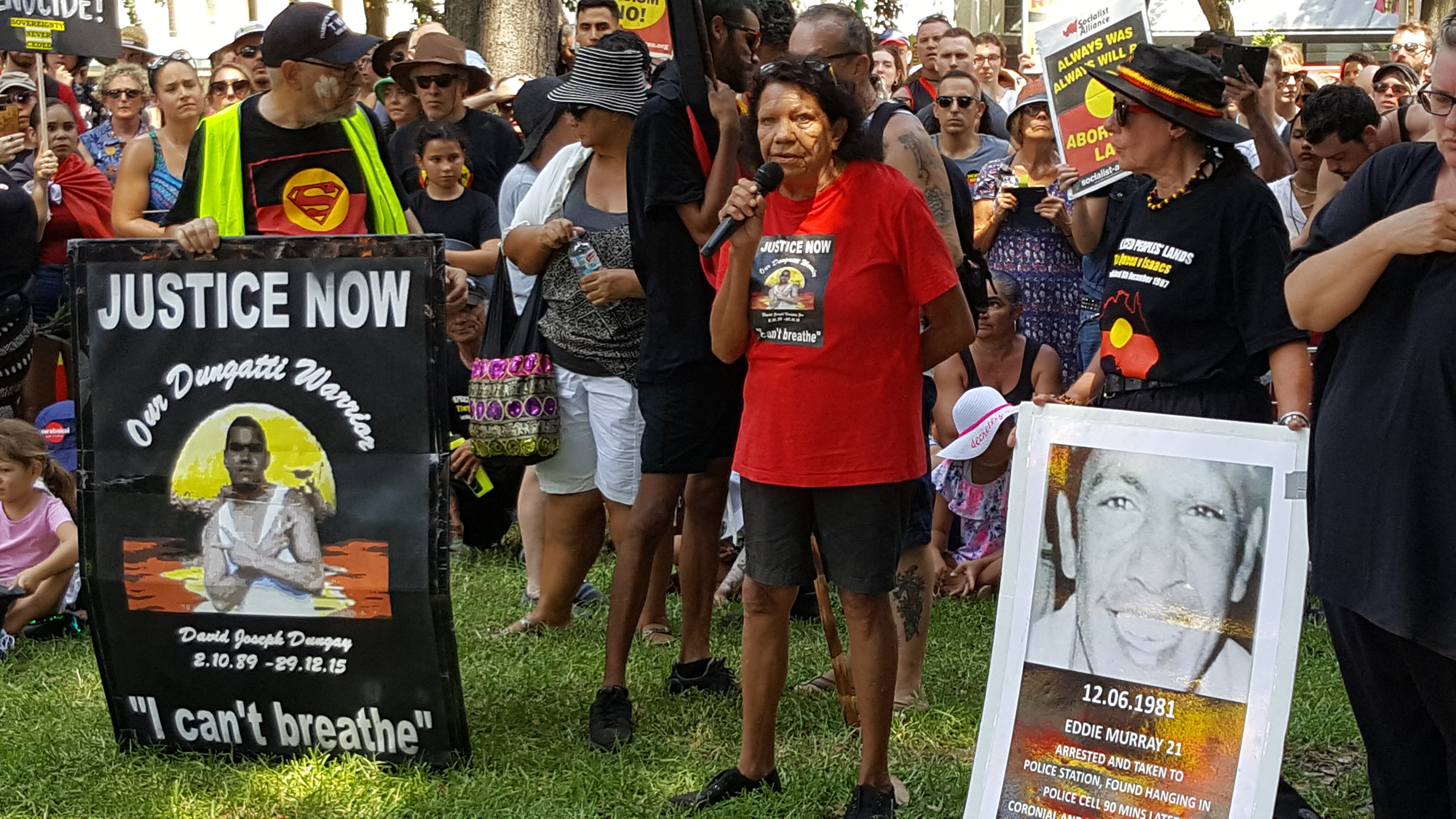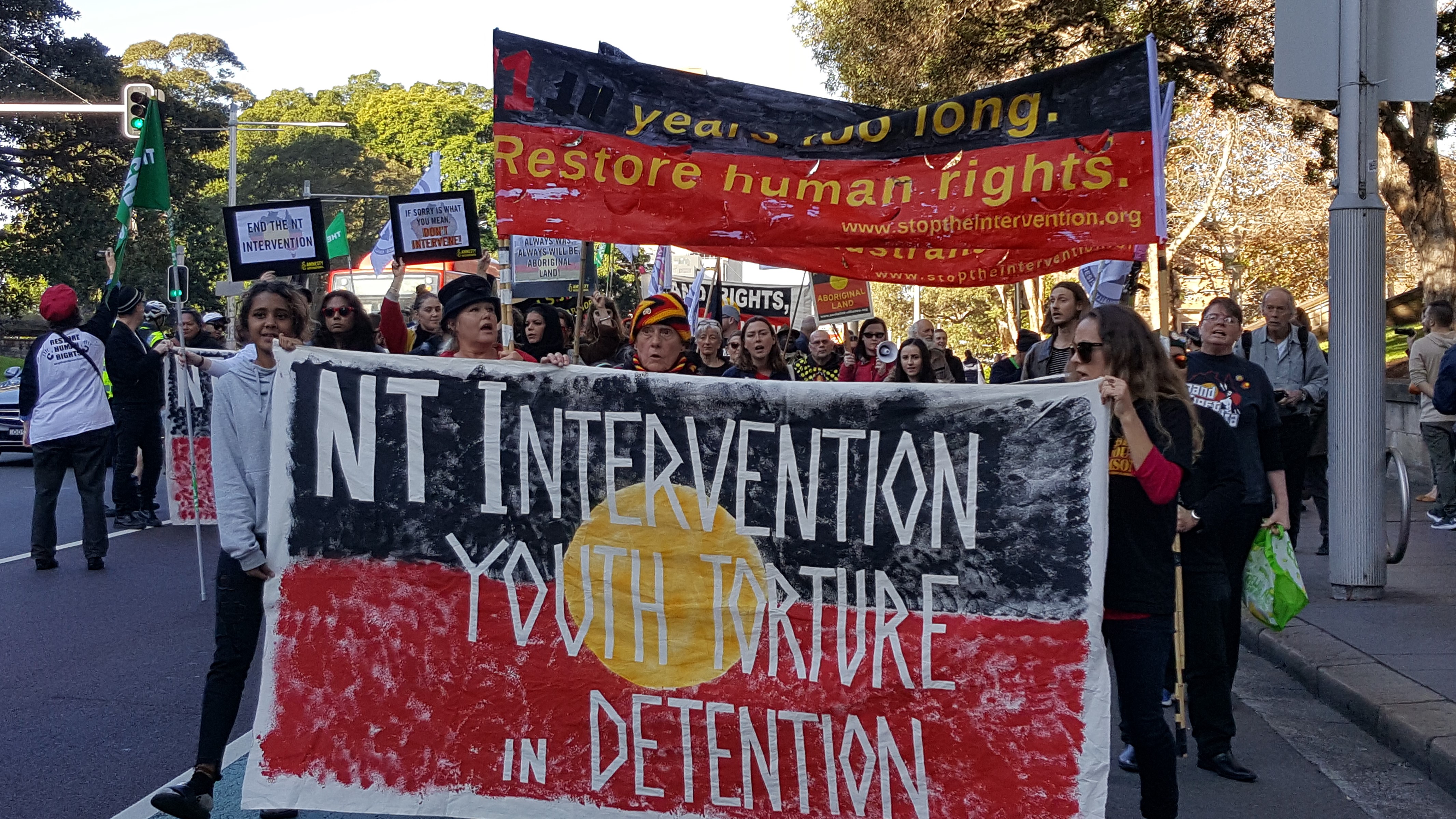Warlpiri lead from strength in Country and culture after Kumanjayi Walker’s murder
Written by: Lindy Nolan on 18 November 2019
(Above: Leetona Dungay speaks about the murder of her son, Dungutti man David Dungay on January 26 this year)
Over four hundred First Peoples have died in custody since the Royal Commission into Aboriginal Deaths in Custody. Every commission recommendation is routinely ignored.
Why then has the death of Warlpiri man Kumanjayi Walker ignited such a big response that a policeman has been charged with murder for the first time?
Warlpiri are deeply connected with struggle, nationally and internationally. That struggle comes from strong culture which comes from land.
They have won important land for ceremony and community spokespeople have high standing.
Warlpiri women and men, including now Senior Lawman Harry Jakamarra Nelson, addressed the UN in 1990, the year after a Warlpiri art exhibition at landmark Centre Pompidou in Paris.
Warlpiri operate a mining company, community store, distribute bush food seed and do environmental repair. They helped fund Warlukurlangu Artists, one of the longest running and most successful Aboriginal-owned art centres in Central Australia. It builds on national and international recognition.
Pirlirrpa rarralya pirliirrpa Pirrjirdi
Yuendumu school reflects the determination of Warlpiri People. Embedded in community, it serves children with bilingual education and culture its heart. Its motto is ‘Pirlirrpa rarralya pirliirrpa Pirrjirdi – Growing them strong in Spirit’.
Another Senior Lawman Ned Jampajinpa Hargraves is a greatly respected leader of the anti-fracking movement, which SEED, the Youth Indigenous Climate Network, helps spread nationwide.
Harry Jakamarra Nelson is a teacher and lifelong activist for land rights, and against the 2007 NT Intervention. He was one of six signatories of a statement against ‘Stronger Futures’ (Labor’s cynically rebadged but barely changed Intervention) by Northern Territory Elders and Community Representatives in Melbourne in 2011.
The NT Intervention
(Above:Anti-Intervention rally in Sydney)
But like all Territory communities Warlpiri face growing repression, outrageous control of every aspect of their lives, divide and conquer lies of fracking corporations and sorry business from suicide.
Harry Jakamarra Nelson said, “The Intervention has a lot to do with this. It has set us right back. The last time Warlpiri People were shot like this was 90 years ago, with the Coniston Massacre. We get no respect at all.”
Senior Warlpiri woman Valerie Napaljarri Martin likened Kumanjayi’s murder to the beginning of the NT Intervention, when troops entered communities and Federal police were again given star chamber powers, including the right to invade homes, search and arrest with no warrant.
These powers remain in Labor’s “Stronger Futures”. Back then others wanted to run away, but she said stay and fight.
Warlpiri and their leaders know too much that the ruling class does not want to become general knowledge. It wants to silence them.
Voice comes from struggle
Within and beyond the Territory, young First Peoples connected to culture led by Elders like Aunty Valerie are standing stronger. They speak out, and each year Invasion Day marches become more powerful. Those protests spread the message of ongoing deaths and theft of children.
In Sydney on January 26, Leetona Dungay said her murdered son David Dungay sixteen times pleaded “I can’t breathe” as prison guards suffocated him. The crowd was still and silent as she spoke, both on January 26 and again on November 13.
Outside Parliament House in Canberra, elected leader of Yolngu Peoples and NT independent state member for Nhulunbuy, Yingiya Guyula, said of Kumanjayi’s murder, “We are always being opposed by foreign law systems that are always coming into our lives without recognising that we have a system of Law and order on Country.”
“Work with our Elders, with our communities, with the Law of this Land. This thing will not happen. These things will not happen.
“Give us a space that we deal with our own offenders, deal with our own communities… You don’t barge in and force your way in and create problems,” Yingiya said.
Yingiya is dangerous to the ruling class because he has always stood in unceded sovereignty, against the Intervention and he seeks Treaties.
He knows first-hand how even a parliamentarian’s voice can be silenced. The movement, not parliament and not whitefella legislation, has given him voice.
The ruling class is afraid of such voices.
“We won’t be silenced”
At a Sydney protest, young Yamatji Wongatha actor Meyne Wyatt said, “We have been oppressed in this country since 1788 and we are still being killed.”
Meyne’s nephew, Elijah Doughty, was left to die after being run over in Kalgoorlie.
Meyne’s father was bashed “within an inch of his life” by six policemen, for assisting neighbouring clan’s people escape Kalgoorlie, after police brutality.
“The top cop that day became Deputy Commissioner of WA Police,” Meyne Wyatt said.
Labelling the hundreds of deaths genocide, he said, “We won’t be silenced. We won’t be quiet and we need you to be angry too.”
No riot, the young get the message out instead
Warlpiri Youth Development Corporation says, police with assault rifles are everywhere in Yuendumu. Some “drove a car at speed through a large crowd at the airport.”
Harry Jakamarra Nelson said, “They expected our young people to riot that night . But they kept their cool and followed our lead.
“I’m very happy with what the young people have done, getting the truth out there on social media! Now there are police everywhere in our community. We want them gone!”
And just as the Senior Warlpiri women led cleansing through smoke and voice at Yuendumu, Uncle Max Dulumunmun Harrison led young Yuin men for fifteen minutes of powerful song and smoke as the central Sydney protest began.
Uncle Max’s soft voice told hard truths about the absurdity of reconciliation with a murderous system, encapsulated in four words that many chanted, ‘No justice no peace’.
We are a continent and islands at war for over 230 years.
Anger impels. But our thinking must be quiet and clear. We need to stand together.
Print Version - new window Email article
-----
Go back
Independence from Imperialism
People's Rights & Liberties
Community and Environment
Marxism Today
International
Articles
| On the introduction of supermarket security checkpoints |
| WOMAD: Marley to perform, Palestinian musicians banned |
| International Women’s Day lifts struggle for liberation of women and socialism! |
| ICOR Call for International Women’s Day |
| We support the international campaign to free Ecevit Piroğlu |
| Workers’ power and closing the loopholes industrial laws |
| Sovereignty, a message to whitefellas |
| When whitefellas dance Ceremony, it’s time for consequences |
| RIghts Of Indigenous Peoples’ Struggles Continue As Governments Side With The Big End Of Town |
| Community school mural censored over First Nations artist's identity with Palestinians |
| Miko Peled speaks truth about the Zionist war against Palestine |
| #FreeDanDuggan - A Fight for Freedom and Australian Sovereignty |
| Mr Mundine, stop harming kids if you want them to go to school! |
| Opposition to Zionism is not anti-Semitism. |
| How Secure Are Australia's Defence Bases? |
| Corporate management and the Alliance for Responsible Citizenship |
| Imperialism and the Israeli state condemned Palestinians to poverty. |
| Microsoft buys into AUKUS and Australian surveillance industry |
| After the referendum, we cannot fight blindly |
| Dan Duggan - a shameful anniversary |
-----


